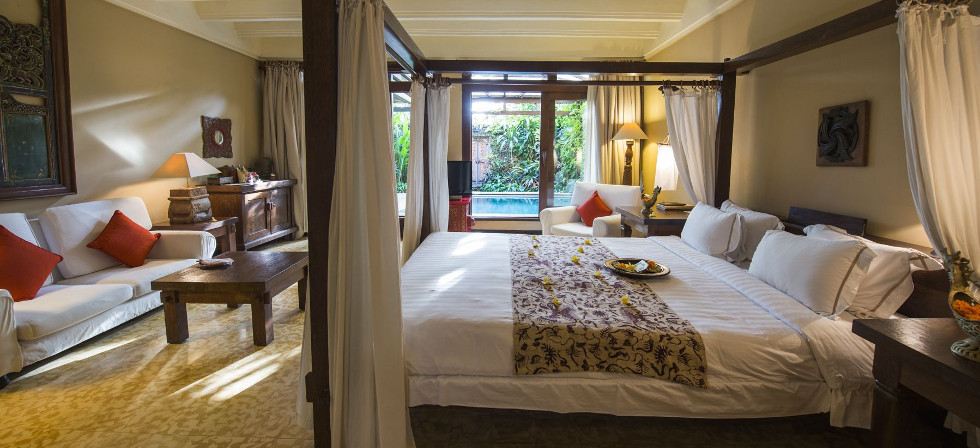With a mission to bring back to life the soul of Indonesia’s yesteryears, Tugu Bali is a hotel with heart. Part museum, part romantic retreat, it’s an elegantly eccentric homage to the culture of its homeland.
Situated in Bali’s hipster hotspot of Canggu, Tugu shrugs contemporary minimal design, instead opting for lavish traditional. Luxury timber villas are scattered down cobbled paths that weave through tropical foliage.
Deep within the labyrinth, is the swimming pool. Tiled in a brilliant blue and framed in raw unpolished stones, it captures the look of a natural lagoon. Dangling climbers and overhanging branches add to this charm, while a little enclaved seating area feels gorgeously private.
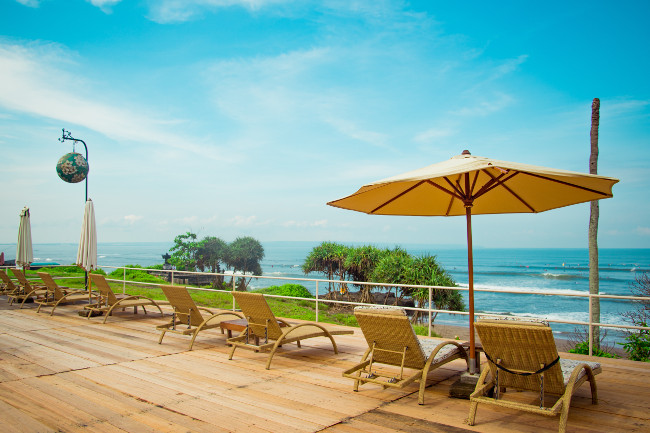
Elsewhere a wooden walkway over a lotus pond provides views across the Indian Ocean. The black sand beach is a striking result of volcanic activity. At dusk, multitiered temples lining the southwesterly shore are silhouetted by a rose-tinged sky.
The hotel exhibits art and antiquities from the ‘bedogol’ or guardian statues at the entrance to the shadow puppet theatre that forms a backdrop behind reception. The founder of the Tugu Hotels, Anhar Setjadibrata, owns the nation’s biggest collection of Indonesian artefacts. The hotels, and there are now four in Indonesia, give him opportunity to share his collection with visitors.
The grand lobby is inspired by the congregation pavilions of Indonesian villages from days gone by. A vast thatched building with regal red interiors and dark wooden panelling, it is crammed with antiques and hums with history. Each week, a cultural evening is held here. Typical Indonesian dishes are served as dancers in elaborate costumes perform the Hindu Ramayana epic.
A 310-year-old wooden temple has been recently converted into a Japanese fusion restaurant that opened in July. Dating back to Kangxi Emperor’s rule during the Qing Dynasty, it was brought from east Java to be lovingly reconstructed. Now it offers sushi and cocktails with menus of parchment in the frame of an oval hand fan.

I chose the Kaiso cocktail. This mixes a seaweed infused Shōchū, a Japanese spirit often made from sweet potato, with citrus and ginger for an umami-rich aperitif. My partner’s request was for an off menu classic, created to perfection. All dishes tasted fresh and authentic; rolls of crispy tempura with avocado smothered in a spicy mayo plus an extraordinarily decadent maki with prawn, caviar and truffle.
After dinner, digestifs were taken down to a raised platform bed on the beach. There we laid on cushions as a breeze softly blew listening to faraway blended beats and the water lapping the shore. Beyond blissful.
Come morning, there is the option to have breakfast wherever you please; any of the restaurants, terraces, garden seating areas or even your own bed should you wish and for no extra charge. The menu has a diverse offering, with asian and western specialities, plus some healthy options such as freshly made smoothies and bircher muesli.
The on site spa is well worth a visit. There is a large plunge pool and a herbal apothecary, plus the standard massages and manicures. In keeping with Tugu’s aim to culturally inspire guests, there is also morning yoga and Balinese dance lessons. For budding chefs, Indonesian cooking classes are held in an open air kitchen.
ROOM
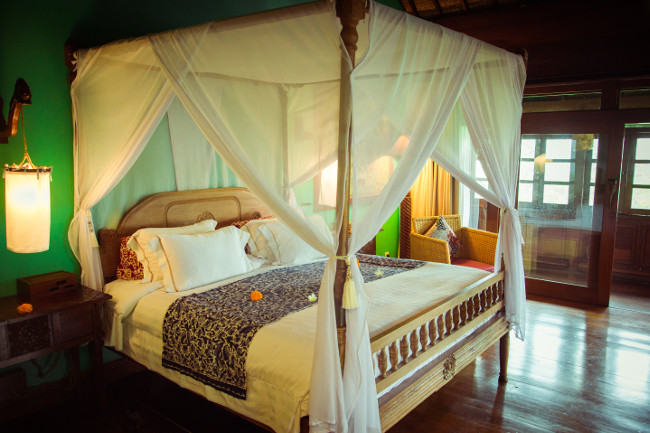
To call the Rejang a room would do it an injustice. It is a full blown suite with a private spa area. Whilst downstairs Dedari suites have a plunge pool. On arrival, the suite is scented with incense and scattered with petals. White muslin nets are romantically draped around the four poster bed, which felt like sleeping on a cloud.
For want of side-stepping inevitable hyperbole, the creaking wooden floorboards and dark rustic furniture could appear gloomy to some. Nooks and crannies stuffed with aged treasures make for a dusty dated decor. But most will revel in its deeply engrained character.
Then, there is a summer room of sorts, with a breakfast table, a daybed and a wall of windows though which sun beams all day. But best of all, is a circular metallic bath sunk into the floor. Filled with steaming hot water, upon which flowers float, it is plenty big enough for two adults. Within reach, there’s candles, incense and matches. As well as bubble baths and shampoos in hand thrown ceramic vases sealed with twisted fabric caps and adorning handwritten labels. It is these thoughtful finishing touches that elevate the weird to the wonderful.
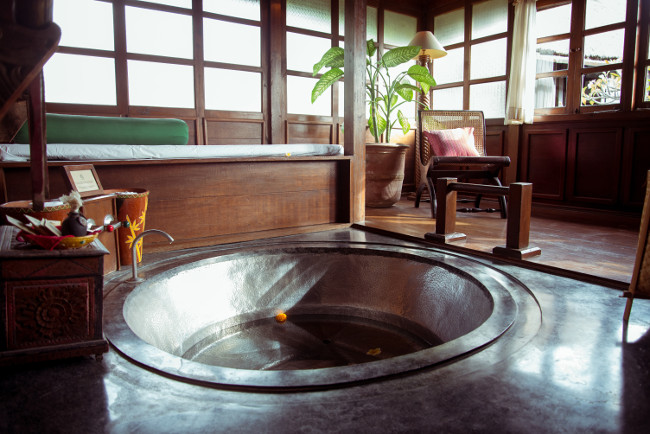
LOCATION
Canggu is the cooler younger cousin to Bali’s long standing socialite supremo that is Seminyak. Popular with surfers and digital nomads, it’s trendier than a Hackney cereal cafe.
Toned tanned tourists whizz mopeds down streets lined with fashion boutiques and cute cafes. Menus read like a checklist of the latest wholefood fads; chia seeds, agave syrup, organic coconut oil. After dark, bars and rooftops have an ambient funky vibe, where renowned international DJs are commonplace. Black Shores Bar and Finns Beach Club are late night favourites.
Above all, Canggu combines all the elements of paradise that make Bali a world class tourist destination; idyllic beaches, vistas of emerald rice paddies and an equatorial climate.
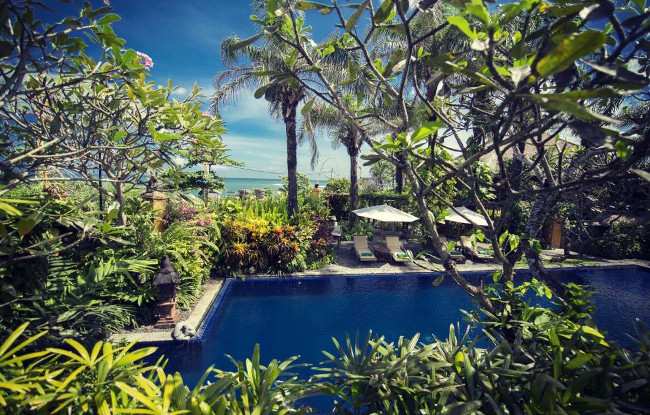
IN A NUTSHELL
Curious and curioser, a stay at Hotel Tugu is a tumble down a Balinese rabbithole. A whimsical fanciful journey into Indonesian history and folklore.
Rooms start at £240 per night.
Address: Jl. Pantai Batu Bolong, Canggu Beach, Bali, Indonesia
Tel: +62 361 4731 702












